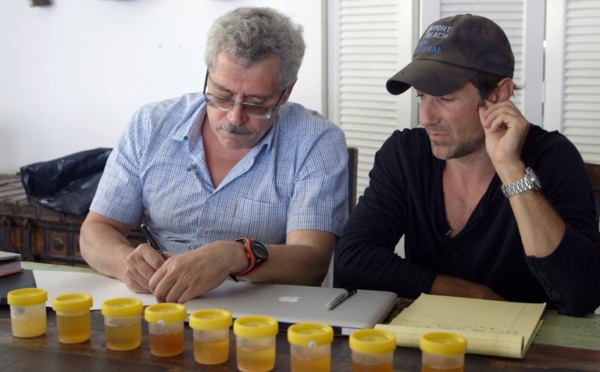Icarus begins as a personal exploration of doping in sports by director Bryan Fogel, but it ends as a meditation on political corruption, with spy thriller overtones. The documentary makes this leap quite suddenly, creating a somewhat uneven and disjointed viewing experience. However, Fogel crafts a tense and thrilling exposé on Dr. Grigory Rodchenkov and his involvement in hiding the Russian state-sponsored doping program, which resulted in Russia’s temporary ban from the Rio Olympics last year.
This film compels because Fogel effectively connects the dots, and he allows Rodchenkov to hold court. Icarus should be lauded for having such a frank and compassionate depiction of someone that the International Olympic Committee (ICO) disowned, and whom Putin calls a “turncoat.” Rodchenkov comes off as a hair-brained but caring scientist caught up in implicit state protocols to help Russia maintain a strong presence on the world stage.
Fogel should also be commended for exposing how deeply political events like the Olympics are. The games are allegedly a neutral medium to display pride in one’s country and celebrate world peace and diversity. When, in fact, countries like Russia (and every other country, especially the United States) use the event to demonstrate national pride and prowess. It’s like showing off one’s military might. The documentary also implies, near the end, that the organizations that compose the Olympics are perfectly okay with this. The ICO director and Putin are shown clinking champagne glasses together despite overwhelming evidence that Russia has an illicit state-sanctioned doping program. The film also implicitly begs us to ask, how many other countries are doping? Are doping bans aimed at creating a “level playing field?” Or is that just the public façade all countries and members of the ICO must commit themselves to, knowing full well almost every country and every athlete cheats?
The movie might have been more concise if it had started with Rodchenkov and moved away from the personal narrative aspects, particularly as Fogel himself fades away into the background and Rodchenkov takes center stage. The Russian does not give an account of why he helped the country get away with doping, nor is he asked. We are not given a cheap, psychological explanation, although many are implied , such as Rodchenkov’s own past as an incredibly strong athlete.
However, the film takes a format that is overly familiar. There are many talking-head interviews, personal confessions, voice-over pontifications, media clips, and a swirl of headlines and newspaper text. At times, it looks more like an MSNBC special edition or a Discovery Channel movie. It is not a cinema vérité, nor is it a more Errol Morris–type documentary that weaves dramatic reenactments and questions of truth. The images seem subordinated to conveying the information at hand, leading to an over reliance on words on screen and voice-overs. The George Orwell references, conveyed through Rodchenkov’s narration and words crawling across the screen, come off as heavy-handed and sloppy rather than thought provoking or offering political analysis.
Icarus, overall, strikes the right notes of personal narrative and provoking political questions. While the film focuses on Russia, it is quite applicable to any modern state. Rodchenkov calls himself another Edward Snowden, a whistleblower, and in a way he’s not wrong. He risked everything in order to expose the Russian state, and even though doping and sports seem inconsequential, it’s another facet through which to look at the state of the world. We seem to live in a world controlled by an unaccountable elite. That Icarus manages to highlight all of this, even if at times for too long, shows that Fogel and his film still has stamina.







Leave A Comment